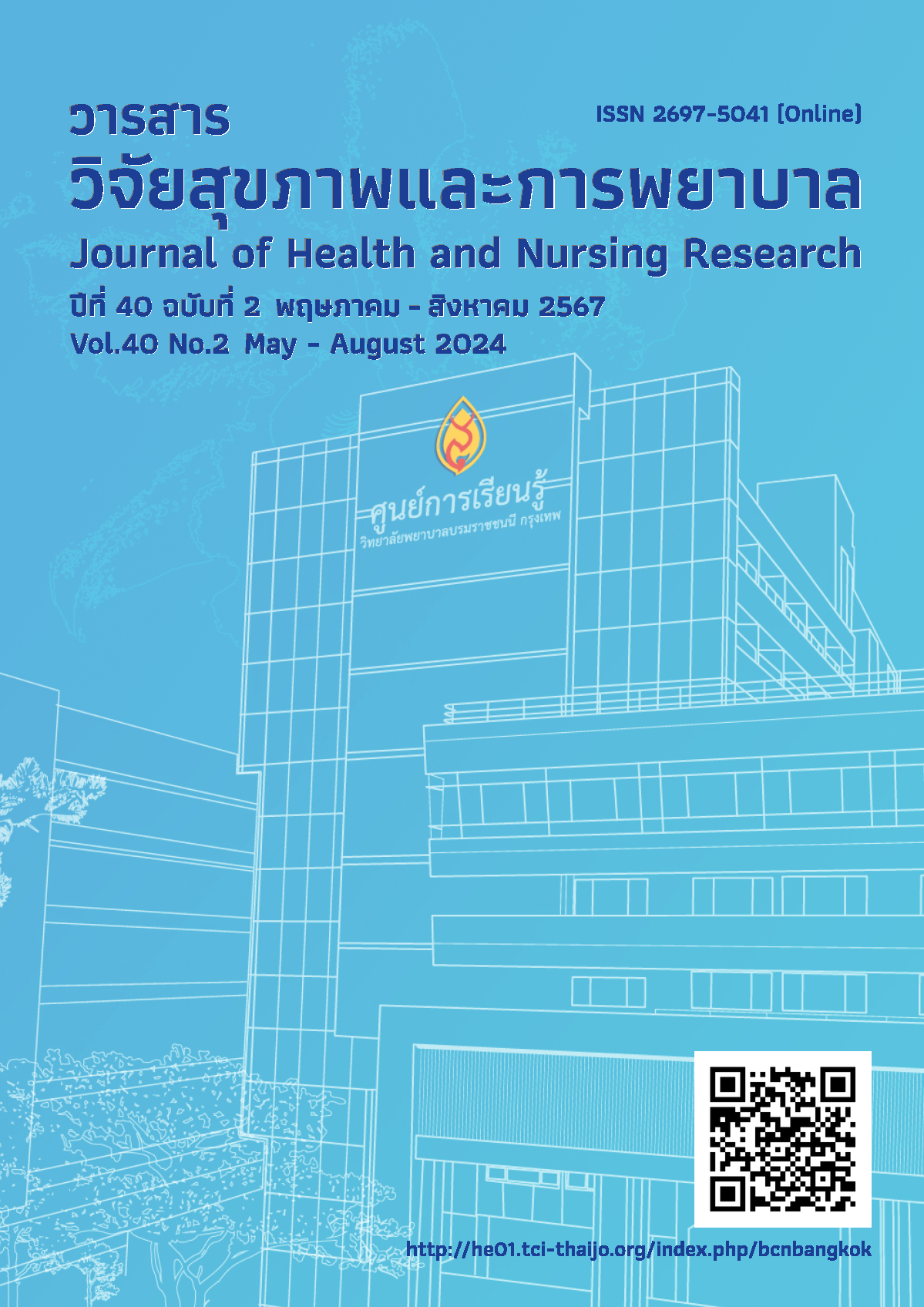ผลของโปรแกรมการส่งเสริมความรอบรู้ด้านสุขภาพต่อพฤติกรรมการส่งเสริมพัฒนาการ ด้านการใช้ภาษาของผู้ดูแล และพัฒนาการด้านการใช้ภาษาในเด็กอายุ 2 - 5 ปี
คำสำคัญ:
โปรแกรมการส่งเสริมความรอบรู้ด้านสุขภาพ , พฤติกรรมการส่งเสริมพัฒนาการด้านการใช้ภาษา , พัฒนาการด้านการใช้ภาษา, ผู้ดูแลเด็ก , เด็กอายุ 2 - 5 ปีบทคัดย่อ
บทนำ: การส่งเสริมความรอบรู้ด้านสุขภาพให้กับผู้ดูแลช่วยสนับสนุนพฤติกรรมการส่งเสริมพัฒนาการด้านการใช้ภาษาของผู้ดูแล และส่งเสริมให้เด็กที่มีพัฒนาการด้านการใช้ภาษาไม่สมวัยมีพัฒนาการดีขึ้น
วัตถุประสงค์การวิจัย: เพื่อเปรียบเทียบความรอบรู้ด้านสุขภาพและพฤติกรรมการส่งเสริมพัฒนาการด้านการใช้ภาษาของผู้ดูแล จำนวนคำศัพท์ที่เด็กเปล่งเสียงออกมา และพัฒนาการด้านการใช้ภาษาของเด็ก ระหว่างผู้ดูแลกลุ่มทดลองและกลุ่มควบคุม
ระเบียบวิธีวิจัย: การวิจัยเชิงกึ่งทดลองแบบ 2 กลุ่ม กลุ่มตัวอย่าง คือ ผู้ดูแลและเด็กอายุ 2 - 5 ปี ที่มีพัฒนาการด้านการใช้ภาษาไม่สมวัย จำนวน 66 คู่ (กลุ่มละ 33 คู่) เครื่องมือ คือ แบบสอบถามความรอบรู้ด้านสุขภาพของผู้ดูแล แบบสอบถามพฤติกรรมในการส่งเสริมพัฒนาการด้านการใช้ภาษา แบบบันทึกจำนวนคำศัพท์ที่เด็กเปล่งเสียงออกมา
และคู่มือเฝ้าระวังและส่งเสริมพัฒนาการเด็กปฐมวัย (DSPM) วิเคราะห์ข้อมูลด้วย Repeated measures ANOVA, Independent t-test, Chi - square และ Fisher's Exact test.
ผลการวิจัย: ผู้ดูแลกลุ่มทดลองมีความรอบรู้ด้านสุขภาพ และพฤติกรรมการส่งเสริมพัฒนาการมากกว่ากลุ่มควบคุมอย่างมีนัยสำคัญทางสถิติ (F = 9.40, p < .003; F = 4.74, p < .033) เด็กในกลุ่มทดลองมีพัฒนาการด้านการใช้ภาษาและจำนวนคำศัพท์ที่เด็กเปล่งเสียงออกมาไม่แตกต่างกับกลุ่มควบคุม แต่ภายหลังการทดลองเด็กกลุ่มทดลองมีพัฒนาการด้านการใช้ภาษาสมวัยเพิ่มขึ้นอย่างมีนัยสำคัญทางสถิติ (p < .01) ในขณะที่กลุ่มควบคุมเด็กมีพัฒนาการไม่แตกต่างกันระหว่างก่อนและหลังการทดลอง
สรุปผล: โปรแกรมส่งเสริมความรอบรู้ด้านสุขภาพช่วยให้ผู้ดูแลมีความรอบรู้ด้านสุขภาพ และพฤติกรรมการส่งเสริมพัฒนาการด้านการใช้ภาษาที่ดีขึ้น และเด็กมีพัฒนาการด้านการใช้ภาษาที่ดีขึ้น
ข้อเสนอแนะ: ควรปรับปรุงโปรแกรม ฯ ให้มีความเฉพาะเจาะจงกับระดับพัฒนาการของเด็ก นำเทคโนโลยีมาพัฒนาระบบติดตามและส่งเสริมพฤติกรรมของผู้ดูแลในการส่งเสริมพัฒนาการอย่างต่อเนื่อง
Downloads
เอกสารอ้างอิง
Sakulrungjalas T, Chaiyaratana C. Empathic communication for connection with children. Journal of Nursing Division 2020;47(3):12-25. (in Thai)
Tansangworn A. High risk newborn development outcomes in Mahasarakham Hospital. Mahasarakham Hospital Journal 2021;18(3)187-200. (in Thai)
Hernandez-Mekonnen R, Duggen EK, Oliveros-Rosen L, Gerdes M, Wortham S, Ludmir, J, Bennett IM. Health literacy in unauthorized Mexican immigrant mothers and risk of developmental delay in their children. Journal Immigrant Minority Health 2016;18(5):1228-31.
Collisson BA, Graham SA, Preston JL, Rose MS, McDonald S, Tough S. Risk and protective factors for late talking: An epidemiologic investigation. The Journal of Pediatrics 2016;172:168-74.
Robert MY, Kaiser AP, Wolfe CE, Bryany JD, Spidalieri AM. Effects of the teach-model-coach-review instructional approach on caregiver use of language support strategies and children’s expressive language skills. Journal of Speech, Language, and Hearing Research 2014;57(5):1851-69.
Kazemi Y, Mohebbinejad F. Persian adaptation of enhanced milieu teaching for Iranian children with expressive language delay. Iranian Rehabilitation Journal 2020;18(1):99-112.
Rajesh V, Venkatesh L. Preliminary evaluation of a low-intensity parent training program on speech-language stimulation for children with language delay. International Journal of Pediatric Otorhinolaryngology 2019;122:99-104.
Korat O, Graister T, Altman C. Contribution of reading an e-book with a dictionary to word learning: Comparison between kindergarteners with and without SLI. Journal of Communication Disorders 2019;79:90-102.
Paakkari L, Sorensen K. Advancing health literacy for equitable access to healthcare towards a guide to health literacy policy, strategy and service design. Council of Europe; 2021.
Toyuso N, Maksingh W. Effects of a perceived self-efficacy promoting program of mothers on their promoting development behaviors of children age 0-5 years. Mahamakut Graduate School Journal 2020;18(2):195-208. (in Thai)
Intarakamhang U, Khumthong T. Measurement development of health literacy and unwanted pregnancy prevention behavior for Thai female adolescents. Journal of Public Health Nursing 2017;31(3),19–38. (in Thai)
Sukpreedee N, Suttiwan P, Ngamake S. The the parent-child play interaction measurement (3-5 years old). Journal of Social Sciences and Humanities 2017;43(1):193-213. (in Thai)
Totsika V, Sylva K. The home observation for measurement of the environment revisited. Child and Adolescent Mental Health 2004;9(1):25-35.
Maiphom S, Leemingsawat V. Health literacy of caregivers of children with Epilepsy. Journal of Sports Science and Health 2020;21(2):269-82. (in Thai)
Aeamsee A, Saranrittichai K. Effects of caregiver’s behavioral modification program on development and positive discipline promotion for pre-school children by application of health literacy concept. Journal of Nursing Science & Health 2022;45(4):30-43. (in Thai)
Sangkkhaw S, Mekrungrongwong S. The effects of a perceived self-efficacy promoting program on perceived self-efficacy, outcome expectations, and preschool child development promotion behavior in caregivers with ineffective development promotion behavior in Mueang Sukhothai district, Sukhothai province. Royal Thai Navy Medical Journal 2022;49(1):95-117. (in Thai)
Curtis P, Kaiser AP, Estabrook R, Robert MY. The longitudinal effects of early intervention on children’s problem behaviors. Child Development 2019;90(2):576-92.
Inson S, Aonkam Y, Ruangrith R. Effectiveness of the development promotion and reinforce positive to improve discipline programs base on family participation to children aged 3-5 years in Mahasarakham province. Academic Journal of Mahasarakham Provincial Public Health Office 2021;5(10):143-60. (in Thai)
ดาวน์โหลด
เผยแพร่แล้ว
รูปแบบการอ้างอิง
ฉบับ
ประเภทบทความ
สัญญาอนุญาต
ลิขสิทธิ์ (c) 2024 วารสารวิจัยสุขภาพและการพยาบาล (วารสารวิทยาลัยพยาบาลบรมราชชนนี กรุงเทพ)

อนุญาตภายใต้เงื่อนไข Creative Commons Attribution-NonCommercial 4.0 International License.
บทความที่ได้รับการตีพิมพ์ เป็นลิขสิทธิ์ของวารสารวิจัยสุขภาพและการพยาบาล (วิทยาลัยพยาบาลบรมราชชนนี กรุงเทพ) ไม่สามารถนำไปตีพิมพ์ซ้ำในวารสารฉบับอื่น


















